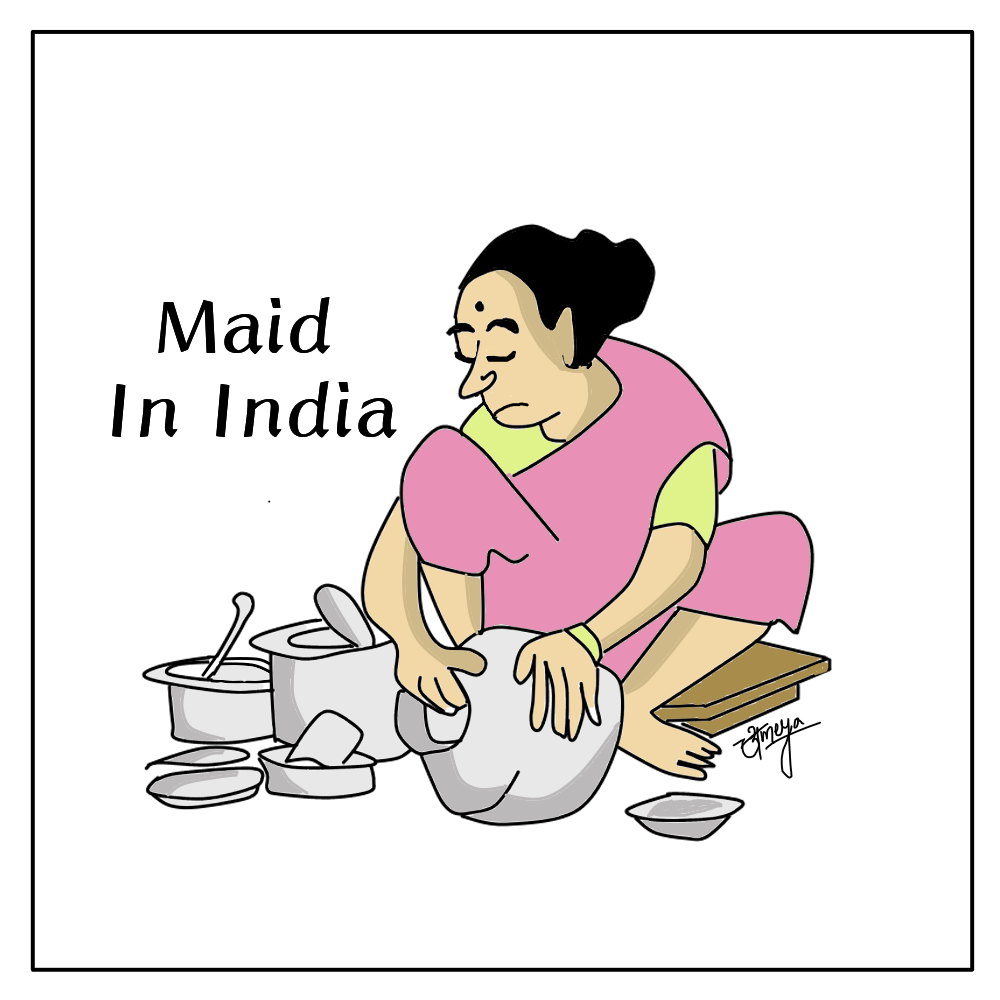October, 2020
What working conditions look like for domestic workers in India- is your home a safe workplace?
4 minutes read
My housemaid: the woman who puts food on my plate, the woman who cleans my home; the woman who washes the clothes I wear; the woman who looks after my children, elders, and even my pets; the woman who makes sure the water bottles in the fridge are filled; the woman without whom my house may spiral into chaos. Millions of women like her drudge every day of the week, trying to make our lives easier. Nevertheless, there is a gaping void between our worlds which blinds us from seeing the darkness in theirs.
We give little thought to what goes behind the indispensable services they provide us. Perhaps if we knew more about the grim reality of their working conditions, we would appreciate them better. If you’ve done her share of the household work by yourself during this pandemic, you know what we’re talking about!
Common workplaces in the domestic work industry include private households, offices, schools, commercial centers, etc. and the work could be full time or part-time. Parameters like wages, paid leaves, health security, differ widely among these workplaces. Within the sector, the section of women who work in private households is the most unorganized.
Domestic workers often lack education and/or skills and the large imbalance between the supply and demand for house helps in the market make them feel “replaceable”.
Furthermore, their caste, class, and gender often make them feel inferior to their employers and prevent them from demanding better treatment such as appropriate wages, leaves, medical benefits, and the resting time, all of which are presented at the employers’ mercy.
Ever wondered what your domestic help’s routine looks like? She wakes up, does housework, goes to employers’ houses, does more housework, returns home, continues with the housework, and finally goes to bed. Not to mention looking after her children, husband, and in-laws, dealing with debts, health struggles, lack of social security, and other such perils of belonging to an unrecognized, unorganized sector. It is shocking how few of them mention ‘rest’ in their schedules. It is also unfortunate how often we, as employers, unknowingly contribute to the misery.

The wages, more often than not, are grossly inadequate and also lower than their male counterparts’ who often do almost comparable types of work. Many domestic workers often express their grievances of employers imposing extra work. Paid leaves have become a privilege only a few workers are rewarded with. For many of us, paid leaves is not an alien concept. We are allowed a few days off on a yearly/monthly basis. Why should it be any different for our househelp? They have to attend work regularly leaving any urgent personal necessities because a lot of employers do not permit any extra leave and deduct wage for absence at work.
Due to their hectic schedule- juggling multiple employers during a single day, many workers have little to no time for breaks, food, or water. The conversation around the health of domestic workers is more or less non-existent. They commonly report that pain and injuries affect numerous parts of their body. Health problems like aches and pains from heavy and/or repetitive tasks; skin problems and allergic reactions to dust, detergents and chemicals; lack of access to menstrual hygiene products and increased work-related pain, etc. are more common than one would think.
Some of the worst faces of this profession are verbal, physical and sexual harassment at the workplace; victimization at the hands of traffickers or placement agencies; forced migration and lack of welfare measures. Live-out workers (maids who live in their own homes outside of their workplace), in particular, bear sexual harassment from community members during their commute to work. Workers also report psychological hardship, including confinement and isolation and degrading treatment. Not just as employers but also as members of society, we must do our best to ensure that our housemaids aren’t vulnerable to such forms of abuse. What we can do is initiate a conversation with them and build trust so that they feel safe talking about issues they might be facing.
Overall, working conditions of domestic workers in the informal sector are deplorable and evidently, factors like class, caste, gender, education and skills, or the lack thereof, only make the situation worse for them. In such a scenario, we must take a second to retrospect and ask ourselves:
- Does my maid have more work on her plate than was initially agreed upon? If so, is she getting paid more for the same?
- Do I make sure she gets sufficient extra wages for extra work?
- When was the last time we offered our maid a cup of chai?
- Does she have access to a secure washroom facility?
- Does she get enough time to eat her lunch?
If your answers to most of these questions were ‘No’ or ‘I don’t know’, then maybe it’s time to assess the situation and be more mindful of the basic needs of your service provider. We can do our bit by trying to help them in whichever way we can. Where to begin? Well, for a start, let’s learn to value them, to appreciate them, and to respect them.
References
- Remote interviews conducted by the team at Women’s Identity and Progress
- ILO: Working conditions of domestic workers (INWORK)
- ILO: Indispensable yet unprotected- Working conditions of Indian domestic workers at home and abroad
- WIEGO: Domestic Workers’ Laws and Legal Issues in India

Leave A Comment